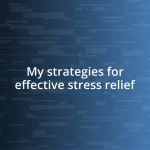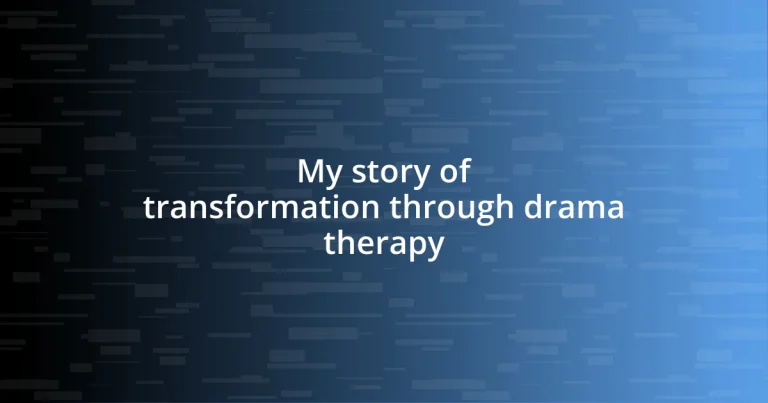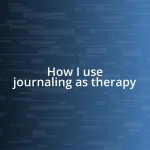Key takeaways:
- Drama therapy utilizes performance arts to facilitate personal growth, allowing individuals to explore emotions through role-play, improvisation, and storytelling.
- Participants experience emotional release, gain new perspectives, and feel empowered by taking control of their narratives through creative expression.
- Success stories reveal transformation and healing, emphasizing the importance of community and shared experiences in the therapeutic journey.
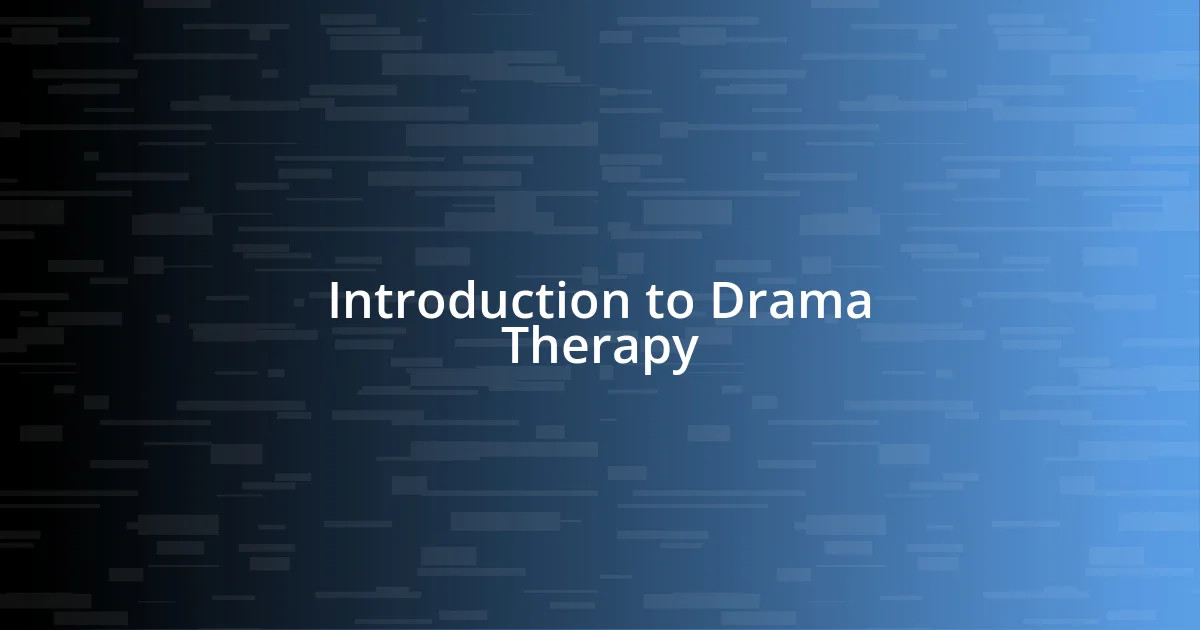
Introduction to Drama Therapy
Drama therapy is a unique form of therapy that uses performance arts to facilitate personal growth and healing. I remember my first experience; stepping onto the stage felt like shedding layers of my past self. Has there ever been a moment in your life where expressing your feelings felt just beyond your reach?
In this therapeutic modality, individuals are invited to explore their thoughts and emotions through role-play, improvisation, and storytelling. I vividly recall a session where I became a character who represented my fears. It was astonishing to see those fears externalized, almost like they became separate entities that I could confront. How liberating would it be if you could face your inner challenges from a safe distance?
With roots in psychology and performing arts, drama therapy fosters a profound connection between creativity and emotional expression. I often found that lines from a play or a simple improvisation could articulate feelings I struggled to voice otherwise. Wouldn’t it be empowering to discover tools that allow us to unearth hidden emotions and narratives?
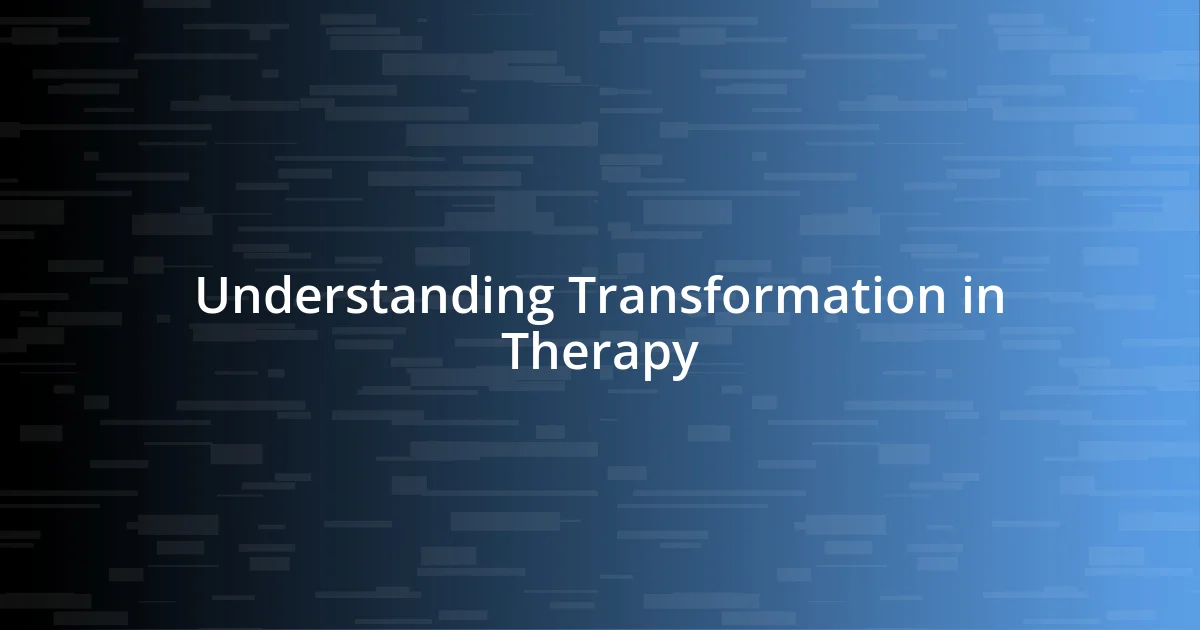
Understanding Transformation in Therapy
Transformation in therapy often unfolds in unexpected ways, transcending mere words. I remember a particularly vivid session where I acted out a scene from my childhood, bringing old wounds into the light. It felt as if I was peeling back the layers of time and emotion, revealing core memories that had shaped my current self. Each session became a stepping stone, guiding me toward understanding my true emotions and experiences.
- Emotional Release: Many clients experience catharsis—an intense release of pent-up emotions that foster healing.
- New Perspectives: Drama therapy allows individuals to view their challenges from different angles, enabling insights that are often obscured in traditional talk therapy.
- Empowerment through Action: By engaging in role-play, clients can take control of narratives, which often leads to a sense of agency and ownership over their healing journey.
It’s fascinating how such creative expression can illuminate paths to personal growth that I hadn’t previously considered. Each improv or role variation nudged me closer to a revelation about myself, bringing clarity that felt both profound and transformative.
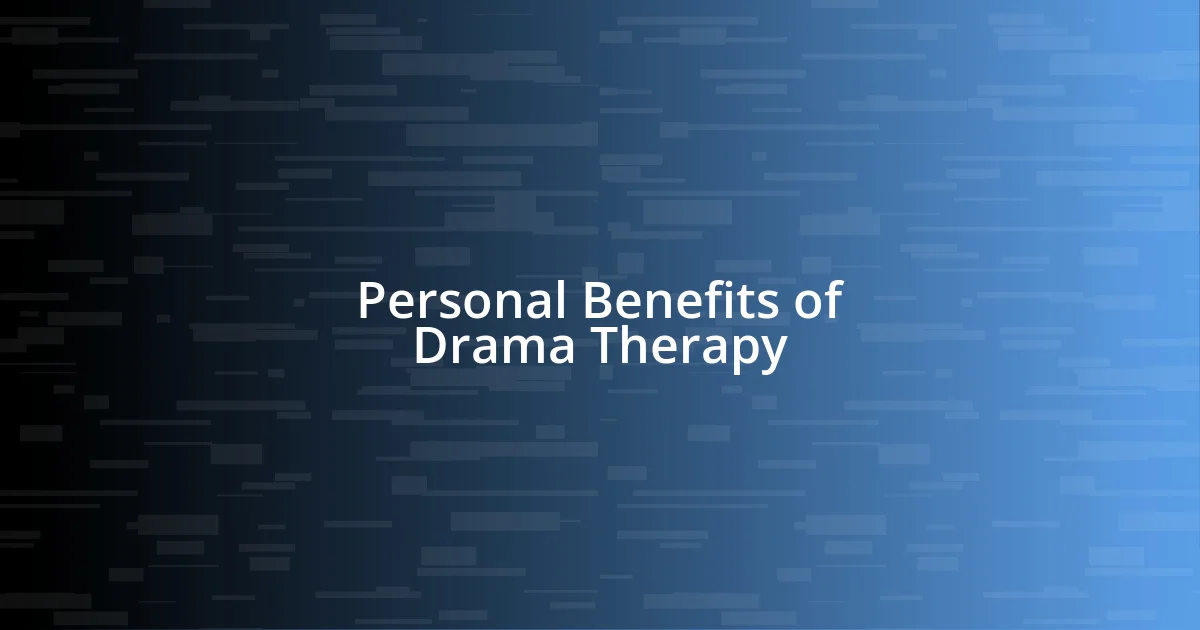
Personal Benefits of Drama Therapy
Drama therapy offers a myriad of personal benefits, most notably emotional healing and self-discovery. I vividly recall a moment when I portrayed a character that embodied my anxiety. It was a revelation—I was able to witness my worries from the outside, almost as if they were actors in my story. This perspective not only diffused their power but also allowed me to explore solutions I hadn’t considered.
Another benefit is the enhancement of social skills and interpersonal relationships. During group sessions, I found myself connecting deeply with others as we engaged in shared narratives. It’s hard to describe the warmth of finding common ground through creative expression. In those moments, we were no longer strangers—we were collaborators, exploring the rich tapestry of human experience together.
Lastly, drama therapy nurtures creativity and self-expression. I remember crafting a scene that reflected my journey, using imagery and dialogue that felt authentic and cathartic. The process reminded me that expressing oneself is not just about words; it’s also about movement, tone, and energy. How remarkable it is to realize that within the bounds of creativity, we can discover parts of ourselves long buried.
| Personal Benefit | Description |
|---|---|
| Emotional Healing | Offers catharsis and perspective, enabling individuals to confront fears from a safe distance. |
| Social Skills | Fosters connection and collaboration, enhancing interpersonal relationships and empathy. |
| Creativity | Nurtures self-expression through movement and dialogue, uncovering authentic voices. |
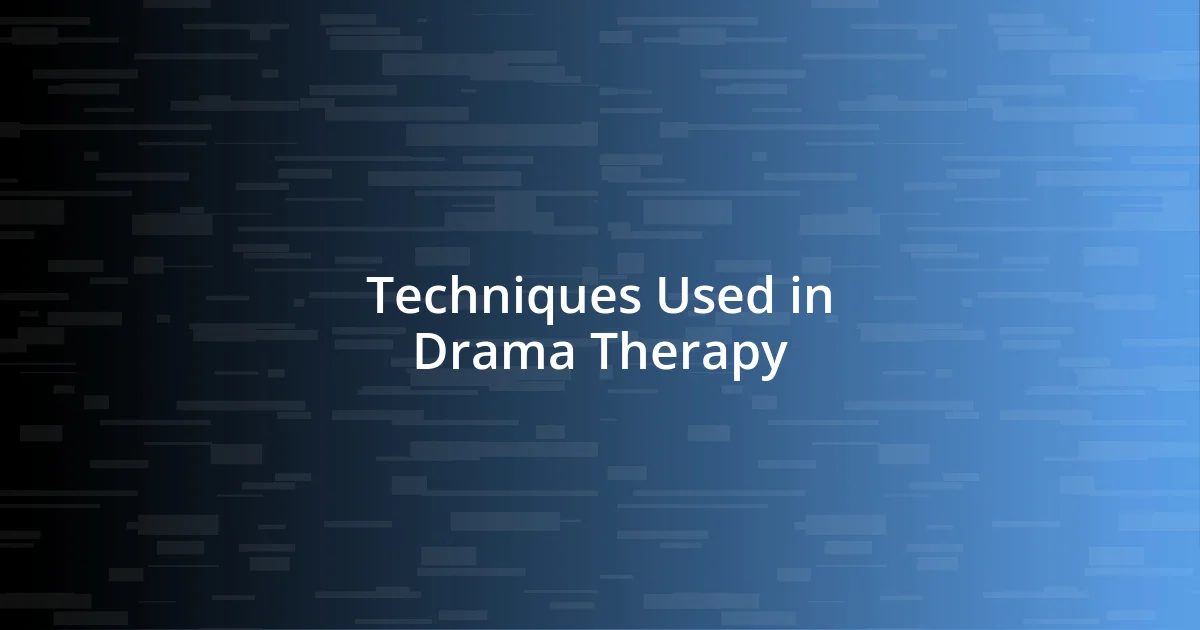
Techniques Used in Drama Therapy
Engaging in drama therapy brings a variety of techniques that can transform the therapeutic experience. One approach I found particularly powerful was called “role-play.” By stepping into different characters, I discovered qualities and emotions within myself that I hadn’t acknowledged before. It was like peering into a mirror that didn’t just reflect my face but my fears, desires, and unresolved conflicts.
Another technique, “improvisation,” pushed me beyond my comfort zone. I remember a session where we had to create a spontaneous scene based on a prompt. The thrill of acting without a script made me tap into raw emotions, and I noticed how it let my creativity flow uninterrupted. I often wonder—how does spontaneity help us confront life’s unpredictability? From my experience, learning to navigate unexpected scenarios through improv translates into confidence in real-life challenges.
Additionally, “storytelling” played a significant role in my journey. By narrating my own experiences and reshaping them through dramatization, I didn’t just recount my past; I transformed it. For instance, when I depicted a challenging moment from my life, I felt a sense of liberation, like I was taking back the narrative. Isn’t it fascinating how sharing our stories can shift our perspective and empower us? For me, it was like discovering a new path paved with understanding and acceptance.

Overcoming Challenges Through Performance
When I think about overcoming challenges through performance, I can’t help but recall a particularly intense scene where I acted out my struggles with grief. Standing in front of my peers, emotions surged as I navigated the nuances of loss through my character’s journey. This experience highlighted how embodying a persona could lead to profound healing; it felt like shedding layers of pain that had been suffocating me.
There was also a time when our group staged a mini-play focused on resilience in the face of adversity. As I stepped into my character’s shoes, I felt a surge of empowerment. It was as if, through performance, I could rewrite my own story. Can acting out our triumphs offer a glimpse of our potential selves? In those moments, I discovered that performing wasn’t just about the character—it was about celebrating my ability to face life’s hurdles.
Each performance acted as a mirror reflecting my inner battles and victories. I remember feeling lighter after portraying a story of overcoming fear. How transformative it was to realize that expressing vulnerability on stage made me stronger in real life! Connecting with that raw emotion allowed me to leave behind the weight of insecurity, embracing a newfound confidence that rippled into my daily living.

Real Life Success Stories
I remember a session that stands out as a turning point in my journey. Our drama therapist encouraged us to create a scene about a significant life change. I chose to portray the moment I decided to leave a toxic job. As I acted out my character’s fear and eventual defiance, I realized that I was not just telling a story—I was reclaiming my power. It struck me how impactful drama therapy can be; through performance, I could express truths I had kept buried, transforming pain into growth.
Another powerful moment was when I shared a scene about reconnecting with a loved one after a long estrangement. The act of embodying our shared memories—both joyful and painful—provided a cathartic release. I could feel the audience’s energy shifting, as we all resonated with themes of forgiveness and healing. This wasn’t just acting; it felt like a collective unburdening of past grievances. Isn’t it incredible how reliving such moments can foster deeper connections?
Reflecting on these experiences, I find it remarkable how drama therapy served as a bridge to understanding myself. Every scene performed was a lesson in vulnerability and resilience. I often catch myself pondering: how many personal revelations are hidden within our untold stories? Through drama therapy, I unearthed those revelations, allowing me to step into my truth while inspiring others to face theirs.

Conclusion and Next Steps
The journey of transformation through drama therapy has been nothing short of enlightening. I often reflect on the various layers I’ve shed along the way—each one marking a milestone. What I’ve learned is that healing is an ongoing process, and each performance is a step toward further understanding myself. It’s essential to carry these insights forward, continually exploring new expressive avenues in our lives.
As I take my next steps, I feel compelled to delve deeper into storytelling, perhaps by writing my own play. This idea excites me because it combines my experiences with creativity, offering a platform to share my journey with others. Have you ever envisioned expressing your life stories in a unique format? I genuinely believe that doing so can not only empower us but also resonate with those who may find solace in our narratives.
Moving forward, I understand the importance of community in this process. Engaging with others who share similar experiences can amplify our healing. By participating in group sessions or workshops, we can build a supportive network, fostering connections that encourage ongoing growth. The beauty of drama therapy lies in its ability to unite us—sharing our struggles and triumphs transforms isolation into camaraderie, doesn’t it?






